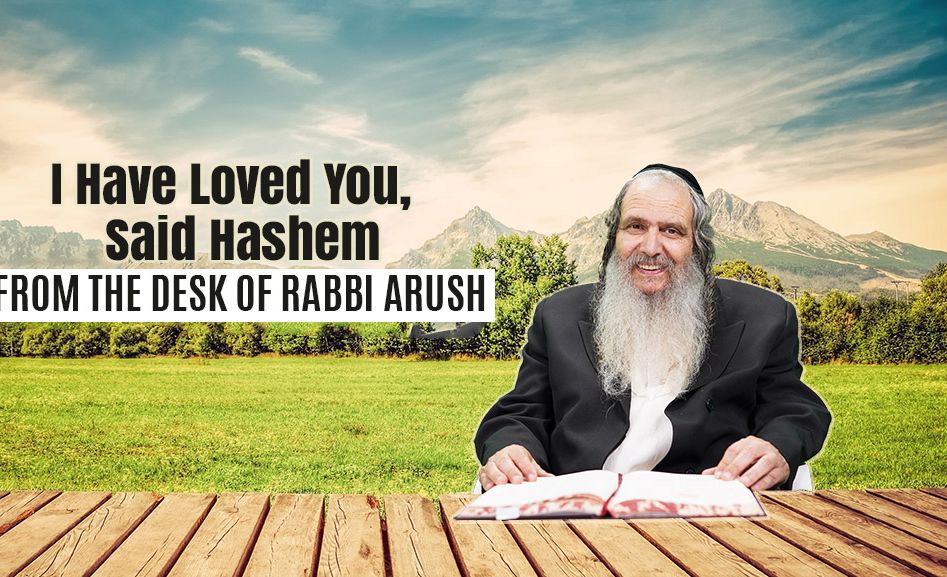
Checks and Balances
We must check ourselves daily, just like we check our rice or sift our flour. But in checking, we must also maintain balance and never lose our joy...

Sometimes, when I’m checking rice, I’m amazed that I find the single damaged grain in any pile. I realise without a doubt that simply because I desired to find it, Hashem laid that grain in full view, mottled-side-up, so that I would see it. If you’ve never checked rice, you must understand that without Hashem’s help it would be impossible to find all the bad grains, without going completely insane wondering if you’d checked it all carefully enough.
The mitzvah of checking our food for infestation is called “birur”, which translates as a spiritual concept into separating the good from the bad. The spiritual effect of doing this mitzvah is Heavenly assistance in the same pursuit in our spiritual lives. Rebbe Nachman emphasizes many times in his writings that the main thing is to understand and separate the good from the bad. No wonder it was one of the first observances I was drawn to, not long before providentially discovering it among the wellsprings of Rebbe Nachman’s advice.
My greatest challenge has been wading through the confusion of my own thoughts, feelings, and reactions to certain laws, mitzvot, in their  practical application. Mostly, I have no real conceptual issues, but somehow actualizing Jewish Law into my life has, quite frankly, been leaving me feeling quite depressed recently. Not exactly the hallmark of a Happy Breslever!
practical application. Mostly, I have no real conceptual issues, but somehow actualizing Jewish Law into my life has, quite frankly, been leaving me feeling quite depressed recently. Not exactly the hallmark of a Happy Breslever!
I have been trying to figure out why, oh why on earth, aren’t I truly happy living with Hashem’s Torah?! Isn’t it the epitome of good, happiness and the ultimate way of life in this world? How is it possible that I can’t find any real joy in ONE SINGLE MITZVA that I do?! And WHY isn’t Hashem handing all this to me on a silver platter with my name engraved on it, no less?
Blessedly, there are many times, when – despite the fact that my head is pounding with the nasty mantra that there is no joy in what I am doing – a small, quiet, yet insistent voice can be heard whispering through the negative din of my thoughts: You know you are doing a mitzvah. That’s Hashem’s Will. That can’t be a bad thing. There has to be some good in it. Don’t worry. Hashem is happy that you are doing it, even if you aren’t right now. There’s a reason.
That voice is my fragile emuna, jostling for expanded space in my clouded heart. It’s my soul, fighting for its life, fighting to be heard. I hear it loud and clear, though I fight it tooth and nail.
Not only has my mitzvah observance been decidedly lackluster, so has been my desire to read anything intrinsically holy. I scan my bookshelves, long stripped of anything more secular than a Hebrew/French/English dictionary, longing to reach out hungrily for Rabbi Nachman’s Advice or any of his books for that magical, Heaven-sent page of wisdom that will save the day. Each time my arm remains woodenly at my side, refusing to reach out and discover anew any soul-saving words. Stubbornness at its worst.
Luckily for me, stubbornness is one of the positive/negative traits that Rabbi Nachman strongly advocates using when in the pursuit of spiritual progress. Recently, for the hundredth time, I stood dumbly in front of the bookshelves, and finally pulled something down. “Wings”, by Rabbi Erez Moshe Doron, his allegorical readings of several of Rabbi Nachman’s stories. Bingo. Turning the pages to “The Exchanged Children”, I was rewarded for my repeated efforts.
Towards the end of the story, the Prince received a magical instrument from The Forest Man (The Tzaddik) that enabled him to understand the song of all the animals. This wondrous object helped him greatly, until at one point he needed to trade it with The Man on The Horse (again, The Tzaddik in a different guise) for the Knowledge of One Thing From Another.
Rabbi Erez teaches this to mean that throughout our spiritual quest, we will receive different “tools” and “instruments” to help us, from the Tzaddik. At each stage of our journey, however, we may need to use something entirely different, and, like the Prince in the story, we should not be afraid to leave something behind, even something that was once wondrous, and take on something new in order to move ahead. We need to be open to change and new tactics in our spiritual journey.
This resonated greatly with me, and although I wasn’t yet sure how I was going to use this new “tool”, I knew that I would find out soon.
This week, I read Rabbi Brody’s article: Strangling Stringencies. It was a pivotal piece in the puzzle. In it, he answers the question he receives from so many religious people, new and old-timers alike: If I’m religious, then why aren’t I happy?! I almost stopped breathing as I scanned ahead to find the answer. Rabbi Brody explains that there are two reasons: Either lack of emuna, or too many stringencies in mitzvah observance.
Emuna, I knew I was lacking. I often prayed to Hashem on that point. But I felt that it had to be something deeper than that. Surely the fact that I was asking for stronger emuna during this trying time was already half the solution. But stringency? That was almost funny, for someone like me. I was barely lighting Shabbat candles on time and doing on-the-spot-teshuva at least 3 times every Shabbat for some mistake or other. NO. Stringency wasn’t my problem….. One of Rabbi Nachman’s teachings I often happily remind myself of is his well documented disdain for such stringencies. But making such a bold argument must have some truth in it, I reasoned, so I thought back a little, and remembered.
Some time ago, I took upon myself certain stringencies in personal modesty, although to be honest, I didn’t know they were stringencies as much as what I had then observed to be the best way to fulfill the dictates of the law. On hindsight, I should have known it was a bad sign when I bawled my eyes out upon making the decision! It has been difficult, to say the least, and I have cried many times to Hashem over the issue but at the same time somehow convinced myself that it was good for me. Worse yet, I have had such a fear of Heavenly retribution and worse, G-d forbid, if I would go back on my decision, that I resigned myself to feeling this way for the rest of my life. I simply tried to follow Rebbe Nachman’s advice, “Only Today”. It was a strong band-aid, but the wound was seeping dangerously. I discovered that this particular stringency was affecting my very sense of self: which of course threw everything else off-balance. Understanding this has finally helped me to put change firmly where it belongs: in clearer perspective.
Now, it seems, the puzzle is almost complete. Checking and Balancing. Separating the good from the bad, finding the right balance to ensure keeping the laws simply and correctly, and knowing which spiritual tools to use at the right time. Practical lessons from Rebbe Nachman joining forces to help me, yet again. Blending them all together, past and present, so that the future will be clearer and hopefully, more joyful.
Hashem showed me, once again, the damaged grain in the pile. I will sift the bad from the good. I am not sad, nor regretful of the stringencies I took upon myself. I learned a lot about myself, and what I am capable of. I also now strongly believe that for two years I was given the ability to physically repent for previous years of immodesty. I am only grateful for this precious tool of perception and observation that I was given to use for this great benefit. Another tool I was blessed with was simple yearning. Yearning for lost emuna, yearning for a stronger connection to Torah, for more joy. Sometimes in tears, usually in silence, mostly for rare stolen minutes before exhausted sleep would take over.
And now? The tentative possibilities of change without fear. To learn afresh from the Tzaddik and take “old” lessons to new heights: to renew my pursuit of joy, to refresh my desire to change and develop. I have grown stale, but despise being in this sorry state. Rabbi Nachman entreats us not to “grow old” in our spiritual growth and observance by remaining in the same place. Somehow, through constant “birur” I’ll keep making the slow, sometimes painful, but hopefully steady trek upwards.
This “growing old” business is certainly on my mind lately: as I rapidly approach my 40th Birthday, I pray I will be blessed with the additional wisdom of the next decade as promised by our sages. Between you and me, I’m counting on a sure thing, because I’m blessed to be guided by the wisdom of Rebbe Nachman.
EPILOGUE:
You might be wondering what my practical decision is on the abovementioned matter of personal modesty: the fact is, I am not putting any limits on myself: not to completely discontinue, nor to continue. Only Today. The main thing was to realize that it IS a stringency, not law, and to feel relaxed, confident and joyful in that knowledge on a practical, daily basis.












2/19/2012
prayer, relaxation, sleep Speaking of the issue of lack of concentration in prayer, Rebbe Nachman said we should find one portion we can pray with true intent, and then try to eventually spread that intention to all the prayers. I think one can think of mitzvot observance in the same way. Even if you don't feel joy in doing most of the mitzvot, surely there's at least one mitzvah that you enjoy doing? Even hitbodedut is a mitzvah. And part of hitbodedut is relaxing and settling the mind through relaxation and meditation on God's love or greatness. I never realized the importance of this silent meditation in Breslov thought until I recently read some amazing passages by Reb Noson in The Tree That Stands Beyond Space: Rebbe Nachman on the Mystical Experience (by R' Dovid Sears). R' Zev Ballen also has some wonderful columns about relaxation techniques. In my experience, even a minute or so of such meditation can be produce a very nice joyful and spiritual feeling, and if it is repeated throughout the day (or in short prayers before mitzvot, as I've heard of R' Arush doing) this can have a big impact on one's day. However, I think a big obstacle to feeling joy (on my part and on the part of my people) is lack of enough sleep. It is very hard to feel happy about anything without enough sleep, but today with all the responsibilities and distractions people have, getting enough sleep seems to be rarer and rarer.
2/19/2012
Speaking of the issue of lack of concentration in prayer, Rebbe Nachman said we should find one portion we can pray with true intent, and then try to eventually spread that intention to all the prayers. I think one can think of mitzvot observance in the same way. Even if you don't feel joy in doing most of the mitzvot, surely there's at least one mitzvah that you enjoy doing? Even hitbodedut is a mitzvah. And part of hitbodedut is relaxing and settling the mind through relaxation and meditation on God's love or greatness. I never realized the importance of this silent meditation in Breslov thought until I recently read some amazing passages by Reb Noson in The Tree That Stands Beyond Space: Rebbe Nachman on the Mystical Experience (by R' Dovid Sears). R' Zev Ballen also has some wonderful columns about relaxation techniques. In my experience, even a minute or so of such meditation can be produce a very nice joyful and spiritual feeling, and if it is repeated throughout the day (or in short prayers before mitzvot, as I've heard of R' Arush doing) this can have a big impact on one's day. However, I think a big obstacle to feeling joy (on my part and on the part of my people) is lack of enough sleep. It is very hard to feel happy about anything without enough sleep, but today with all the responsibilities and distractions people have, getting enough sleep seems to be rarer and rarer.